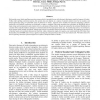Free Online Productivity Tools
i2Speak
i2Symbol
i2OCR
iTex2Img
iWeb2Print
iWeb2Shot
i2Type
iPdf2Split
iPdf2Merge
i2Bopomofo
i2Arabic
i2Style
i2Image
i2PDF
iLatex2Rtf
Sci2ools
106
click to vote
LREC
2010
2010
Error Correction for Arabic Dictionary Lookup
We describe a new Arabic spelling correction system which is intended for use with electronic dictionary search by learners of Arabic. Unlike other spelling correction systems, this system does not depend on a corpus of attested student errors but on student- and teacher-generated ratings of confusable pairs of phonemes or letters. Separate error modules for keyboard mistypings, phonetic confusions, and dialectal confusions are combined to create a weighted finite-state transducer that calculates the likelihood that an input string could correspond to each citation form in a dictionary of Iraqi Arabic. Results are ranked by the estimated likelihood that a citation form could be misheard, mistyped, or mistranscribed for the input given by the user. To evaluate the system, we developed a noisy-channel model trained on students'speech errors and use it to perturb citation forms from a dictionary. We compare our system to a baseline based on Levenshtein distance and find that, when e...
| Added | 29 Oct 2010 |
| Updated | 29 Oct 2010 |
| Type | Conference |
| Year | 2010 |
| Where | LREC |
| Authors | C. Anton Rytting, Paul Rodrigues, Tim Buckwalter, David Zajic, Bridget Hirsch, Jeff Carnes, Nathanael Lynn, Sarah Wayland, Chris Taylor, Jason White, Charles Blake III, Evelyn Browne, Corey Miller, Tristan Purvis |
Comments (0)

